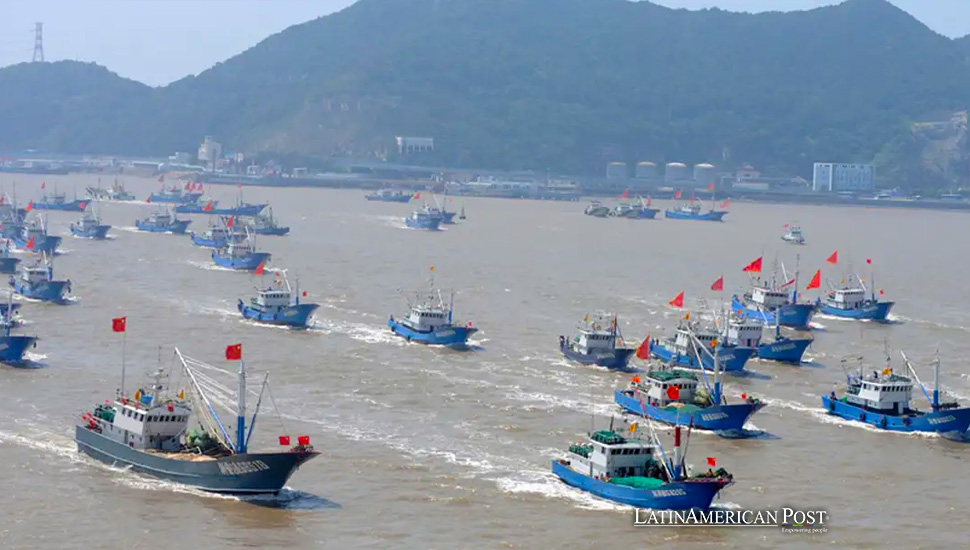A Silent Crisis as China’s Fishing Fleets Threaten Latin America’s Marine Ecosystems

China’s aggressive fishing practices near South American shores are depleting fish stocks and challenging regional economies, sparking urgent calls for action from Chile, Peru, Ecuador, and Argentina to safeguard their marine biodiversity and local livelihoods.
A silent crisis brews in the vast, open waters where the sovereignty of Latin America’s coastal nations ends and the high seas begin. The influential Chinese fishing fleet, armed with invasive fishing methods, skirts the edges of national jurisdictions, threatening South American countries’ marine ecosystems and economies. This situation has escalated concerns among local authorities, who struggle to halt the plundering of their maritime resources.
A Regional Challenge
From the cold waters off the southern tip of Chile to the rich biodiversity along the coasts of Peru, Ecuador, and Argentina, the impact of the Chinese fishing fleet is a shared concern across the continent. These nations, blessed with abundant marine life, are on the frontline of an environmental and economic crisis fueled by unsustainable fishing practices.
Argentina’s Plight
Argentina experiences severe depletion of its marine species, such as squid and the Patagonian toothfish, mainly due to foreign vessels, predominantly under the Chinese flag, operating in the southwest Atlantic. The area, a crucial biodiversity hotspot for spawning and feeding marine wildlife, including the southern right whale, lacks protective regulation, enabling harmful fishing practices. As monitored by Global Fishing Watch, the increase in fishing efforts by Chinese vessels underscores the situation’s urgency.
Argentina experiences severe depletion of its marine species, such as squid and the Patagonian toothfish, mainly due to foreign vessels, predominantly under the Chinese flag, operating in the southwest Atlantic. The area, a crucial biodiversity hotspot for spawning and feeding marine wildlife, including the southern right whale, lacks protective regulation, enabling harmful fishing practices. As monitored by Global Fishing Watch, the increase in fishing efforts by Chinese vessels underscores the situation’s urgency.
The Blue Hole, a rich oceanic ecosystem in the southwestern Atlantic, 200 nautical miles off the coasts of Argentine Patagonia, has become the Wild West for Chinese fishing vessels, preying on species like squid and Patagonian toothfish in international waters, free from control and regulation. Located about 500 kilometers east of the San Jorge Gulf, on the border of Argentina’s Exclusive Economic Zone (EEZ), which extends up to 200 miles from the coast, this area is a biodiversity treasure, key for spawning and feeding birds and marine mammals, such as the southern right whale.
Despite its enormous biological importance, this zone in international waters is unprotected. No global or regional body regulates or controls the growing and harmful fishing practices there. During the high fishing season, from January to July, about 400 vessels gather in this area: they deploy bottom trawling nets to fish for hake and turn on their lights to attract squid. According to data from the Global Fishing Watch platform, the apparent fishing effort of Chinese vessels in that area increased from 61,727 hours per 500 square kilometers in 2013 to 384,046 hours in 2023. In other words, it sextupled. Although there are vessels from South Korea, Taiwan, and Spain, the majority are Chinese-flagged.
Peru’s Struggle Between Law and Reality
In Peru, the transparency claimed by China contrasts sharply with the outcry from conservationists and fishing communities over illegal incursions into Peruvian waters. Despite legislative efforts to curb such practices, including a law intended to restrict port access to vessels using Peruvian satellite systems, political and economic pressures have undermined these regulations, allowing Chinese vessels to continue their operations.
Chile’s Fight for Sustainability
Chile faces the challenge of illegal fishing by the Chinese fleet, which threatens the sustainability of its marine resources and disrupts the natural migration patterns of fish and mammals, leading to ecological imbalances such as red tides. Despite no recorded illegal fishing violations, the constant transit of Chinese vessels through Chilean waters demands vigilant monitoring and enforcement.
Ecuador’s Vigilance Over a Marine Sanctuary
Ecuador, too, grapples with the presence of the Chinese fishing fleet, especially near the Galápagos Islands, a marine reserve of unparalleled conservation value. Incidents like the capture of a vessel loaded with thousands of sharks within the reserve have prompted diplomatic commitments from Beijing to restrict fishing activities. However, the operations of the heavily subsidized Chinese fleet remain primarily opaque, raising concerns about the sustainability of critical species like the giant squid.
A Call to Action
The situation demands a concerted effort from affected countries to enforce stricter regulations and engage in international diplomacy to ensure sustainable fishing practices. The overexploited waters of South America are a stark reminder of the global challenge of balancing economic needs with environmental preservation. As these nations band together to confront the threat posed by foreign fishing fleets, the future of their marine biodiversity and local economies hangs in the balance.
Also read: China’s Deep Dive into the Moon’s Chemistry
The ongoing crisis underscores the need for a global reevaluation of fishing practices and international cooperation to protect the world’s oceans. As South American countries navigate the complex waters of diplomacy, conservation, and economic interests, the actions taken today will determine the health of their marine ecosystems for generations to come.




